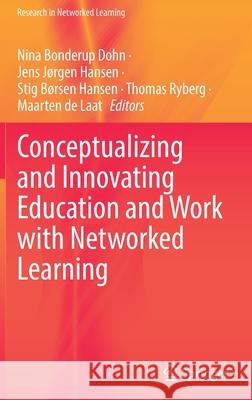Conceptualizing and Innovating Education and Work with Networked Learning » książka



Conceptualizing and Innovating Education and Work with Networked Learning
ISBN-13: 9783030852405 / Angielski / Twarda / 2021 / 288 str.
Conceptualizing and Innovating Education and Work with Networked Learning
ISBN-13: 9783030852405 / Angielski / Twarda / 2021 / 288 str.
(netto: 537,98 VAT: 5%)
Najniższa cena z 30 dni: 501,19
ok. 16-18 dni roboczych.
Darmowa dostawa!
Foreword
Nina Bonderup Dohn is Professor of Learning & ICT at the Department of Design and Communication, Head of Centre for Learning Computational Thinking, and Senior Fellow at Danish Institute of Advanced Study, University of Southern Denmark. She holds a PhD in Learning Theory and a Higher Doctorate Degree in Applied Philosophy. She is a member of the Steering Committee of the International Networked Learning Conference and editor of the Springer book series. She currently holds a research grant from Independent Research Fund Denmark for the project Designing for situated computational thinking with computational things. Her main research areas integrate epistemology, learning sciences, web communication, and technology-mediated learning, focusing on the role of tacit knowledge.
Jens Jørgen Hansen is an Associate Professor in Knowledge Communication at the University of Southern Denmark. He holds a PhD in educational technology and digitalization. His research areas integrate digital literacy, academic literacy, educational technology and learning sciences with a focus on pedagogical communication.
Stig Børsen Hansen is an Associate Professor at the Department of Design and Communication. He holds a PhD in philosophy from Leeds and his primary research interests are theories of learning and philosophy of technology. He is affiliated with the Center for Learning Computational thinking and Center for Culture and Technology at the University of Southern Denmark.
Thomas Ryberg is Professor of PBL and digital learning in the Department of Planning at Aalborg University (AAU), Denmark. He is part of the “Aalborg Centre for Problem Based Learning in Engineering Science and Sustainability under the auspices of UNESCO”. His primary research interests are within the fields of Networked Learning and Problem Based Learning (PBL). In particular, he is interested in Problem Based Learning, and how new media and technologies transform our ways of thinking about and designing for Networked and Hybrid Learning. He is co-chair of the International Networked Learning Conference and editor of the Springer book series. He has participated in European and international research projects and networks (EQUEL, Kaledioscope, COMBLE, PlaceMe, EATrain2, ODEdu), and in development projects in South East Asia and Latin America (VISCA, VO@NET, ELAC). Currently, he is engaged in the PBL future project which is developing new directions for PBL in a digital future.
Maarten de Laat is Professor and Director at the Centre for Change and Complexity in Learning (C3L), University of South Australia. His research focuses on learning and value creation in social networks. He uses practice-based research methodologies to study the impact technology, AI, learning analytics and social design has on the way social networks and communities work, learn and innovate. Maarten is co-chair of the international Networked Learning Conference and editor of the Springer book series on Research in Networked Learning.
The chapters in this book build upon selected research papers from the 12th International Networked Learning Conference 2020, hosted by University of Southern Denmark, Kolding. The selected chapters were chosen as cutting-edge research on networked learning which reflected focal discussion points during the conference such as: new demands on teachers in online and hybrid learning environments; organization of professional learning to meet and reflect on these demands; support of educators and students’ digital literacy; the interaction of human and technological agents in networked learning; and the development of new of networked learning designs to critically and creatively make use of technological possibilities.
The book is organized into three main sections: 1) Professional learning, 2) Learning networks’ development and use of digital resources, and 3) Innovating Networked Learning. Preceding the three main sections is a first chapter, which presents a discourse analysis of how the term “networked learning” has been used in the papers at previous Networked Learning Conferences. The concluding chapter draws out perspectives from the chapters and point to emerging issues within the field of networked learning.
1997-2026 DolnySlask.com Agencja Internetowa
KrainaKsiazek.PL - Księgarnia Internetowa









